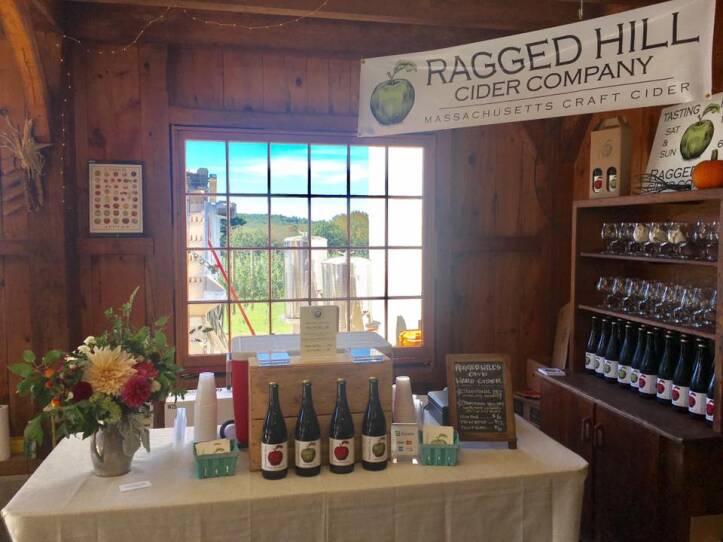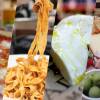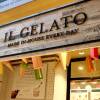Our Eastern cideries tend to vacillate between pure appley goodness and delightful concoctions that pair apples with fruit and spice. But as we head into the central lands of our fair state, the cider houses begin to almost solely focus on the the apples that go into their brews. From the encyclopedic brains behind Stormalong to the homesteading experiments of Pony Shack, each cider maker had a lot to offer – both in terms of ciders and knowledge. On my drive through the middle of the state, I learned a lot about apple selection… and what, exactly, goes into a good cider.

Stormalong – Mad about the Apple
While all cider maker are ardent about apples, few have the (dare I say it?) obsession with varietals that Shannon Edgar, founder of Stormalong does. Dedicated to precise combinations of heirloom apples to create new and delicious flavors, Edgar has an impressive knowledge of what can be made from this classic fruit.
“When I first started making cider, I didn’t know much about it, to be honest,” says Edgar. “I started getting really into apples, and [then] really learning about what’s possible.”
In the small barn where Stormalong first began their cider-making, we dive into a selection of the brand’s extensive catalog, starting with the Legendary Dry, a bright cider with a strong apple presence at the front – a fact that is unsurprising when you find out it utilizes 14 different cultivars. But it doesn’t always take such a diversity of apples to create the perfect cider. With their Mass Appeal blend, Edgar and team utilize only three apples – Northern Spy, Jonagold and Golden Delicious – to create a warm, fresh-off-the-tree flavor that you can barely believe would give you a buzz. Looking to branch into something a little more exotic? The Dry Hop might be the direction for you: made with whole leaf citra hops, this cider is spicy and citrusy, an elegant balance with the inherent sweetness of the apple. Similarly creative is the Grand Banks Barrel Aged, which extends the process by aging the cider in whiskey or rum barrels. The result is both tart and rich, with a faint whiskey aftertaste.
But it’s with their Rare Apple series that Edgar was really able to get his hands dirty, and expand upon his knowledge of cultivars. The first cider from the run, Boston Heirloom, combines Roxbury Russet and Baldwin apples, and comes across as tart, a little sour, and refreshing as hell. On the other end of the spectrum is Kingston Black, a cider made from classic UK varietals that is earthy, rich and spicy. Both are truly evidence of Edgar’s knowledge of the past and beliefs about the future of cider:
“We’re just getting to the point in cider where people are getting their eyes opened to [apple varieties].” he tells me. “I think that there is a much bigger world out there in cider if you really start looking at the apples and what they can do.”

Ragged Hill Orchards – The Family Business
Ragged Hill Orchards is located in West Brookfield, a little left of center when it comes to the Massachusetts map. Now, Ragged Hill is about five minutes from where your author grew up, so please understand that when I say it is some of the most lovely country in our fair state, this statement is not to be disputed in the comments section. Truly, though, as rolling hills of orchards and fields of hay fall away from small country roads a strange sense of nostalgia rises in you – even if you didn’t grow up in the area.
Nostalgia is a word that rings true, too, when you meet Steve and Anne Garwood, the father and daughter duo who partnered with the Orchards to create their new line of ciders. Both grew up in town, though each had their own travels abroad – Steve to work on science documentaries for both PBS and Discovery, and, years later, Anne to marketing in San Francisco. But over time, both father and daughter found that their roots bought them back.
“It’s a lot of satisfaction for me to have a multi-generation business,” Steve starts, and daughter Anne picks up the thread: “My dad started talking about doing this, and I was really excited to be a part of it… to build something for our family and our future.”
The concept of Ragged Hill has been ten years in the making, with Steve perfecting his process before the trees were even in the ground. But it all makes sense with your first taste – apple-focused and forward, this is a classic English-style cider, with carefully selected apples and a carefully created recipe. Their traditional dry is tart and crisp with an earthy undertaste that is delightfully refreshing. And their semi-dry is fruity and fresh, with lovely floral notes offset by a trace of bitter fruit.
“We’ve got the best apples in the world – so we should be getting a reputation for making the best cider in the world.” says Steve. “This is the Napa Valley of apple growing, here.”
But unlike Napa, Ragged Hill is a quick jaunt from Boston or Worcester or Springfield, the perfect stop on your road trip to the Berkshires from the East, or Boston from the West. And while Anne and Steve are selling bottles out of Ragged Hills country store right now, next spring will see the opening of their tasting room on site – and hopefully a few more flavors from this dynamic duo!
Pony Shack – Finding a Lifestyle (pictured above)
One of the best things about cider is how apt it is at building community. From Johnny Appleseed on, cider has given us an excuse to gather, and an instant topic of conversation. But it’s not often that you start with making friends and end up with a great batch of cider – and a blossoming business. Unless you’re Nate McKinley, that is, who got more than he bargained for when he and his wife Tessa moved their family out to Boxborough, MA.
“In searching for a way to get connected to our community, Nate joined the Harvest Fair committee,” says Tessa. “We made jam and canned food… cut our own firewood.”
“This was a natural progression of that.” Nate chips in. “We’re not looking to be millionaires, we’re just looking to do what we like.”
But while they talk about their cider as a simple act of creation – in line with the raised garden and tapped maple trees in the backyard – it’s very clear that Pony Shack Cider stands out. And as I sampled three of their bottles –Fifer’s Dream, Barrel-Me-Over and 3 Fifes– it became clear why. The level of care and thought that went into each cider was obvious in their distinct flavor profiles and the creative notes they incorporate.
While their flagship, Fifer’s Dream, is called a classic dry, it manages to weave in tart and nutty notes, with a sweet finish. Barrel-Me-Over trades in the sometimes-cloying bourbon taste of most barrel-aged ciders for a warm, sweet vanilla that ends on a tart note that’s all apple. And their latest and greatest, 3 Fifes, pairs locally-bred apples with Bartlett pears for a sweet, sour and funky drink that you could easily finish on the back porch. They may not by looking to be millionaires, but they’re definitely in the position to make a life out of what started as a Harvest Fair-inspired project. And hopefully that’s just what they’ll do – they’ve plans to open a new brewing and tasting space in Boxborough this coming year.
“Well, the biggest thing we’ll do in the new space is up the game.” Tessa starts, looking to Nate. He nods. “Last year we did 1,600 gallons… but my goal in the new space is 5,000. I’m a couple years in here, and it’s time to take the plunge.”
We can't wait.

Carr’s Ciderhouse – The Future of Farming
Carr’s Ciderhouse is located all-too conveniently in the rolling acres of farmland that stretch between the avant-hippiedom of Northampton and college-bound air of Amherst. First moving into the area in the early oughts, Jonathan Carr and Nicole Blum quickly found themselves enjoying the area enough that when they discovered an orchard on the northwest slope of Mount Warner, they snapped it up, investing their remaining money into ciders trees. And then? They waited for their work to, well, bear fruit. While their patience and dedication has served them well, it certainly isn’t the life for someone who doesn’t have that something special.
“We have a DIY ethos. I built my house, I built this barn, I rebuilt the press,” Jonathan tells me on the cloudy day that I visit the small outbuilding on their property that serves as their cider fermentation house. “The fact that we’re really tiny allows us to do it… It’s a lot to juggle, but it’s interesting to figure it out… Honestly, we’ve made a million mistakes.”
Mistakes that could seem like the beginning of the end for others only appear to be bumps in the road for Carr and Blum. Because, despite deer eating their crops, searches for grants and the five-year wait for apple trees to mature, everything they produce is simply exquisite. Their Farmhouse Cider is made with a French wine technique called battonage, which involves stirring up the yeast during fermentation. The result is a dry, unfiltered and deliciously yeasty blend with strong fruity notes as you continue drinking. On the opposite end of the spectrum is their Cider Black, a black-current infused cider that is inspired by their years in the UK – deliciously sweet with a tart bite at the back, it's a sure winner for those of you not fond of the drier British styles. Finally, their Pommeau is an apple-brandy enhanced cider that is aged in oak – not too sweet, not too smoky, but delightfully rich and smooth. In addition to their hard ciders, they also sell cider vinegar, shrubs (called 'switchel') and syrups.
But despite the quality of their product, and the independence that their homespun craft affords them, Blum and Carr do have concerns for the future.
“Something that is troubling for an orchard is thinking about climate change. A lot of the varieties, the Massachusetts varieties are meant for cold crisp weather. An apple that’s meant to be grown up north doesn’t develop the same texture and flavor if grown elsewhere… how do you hedge against that?” Carr poses to me. “How do you plan for 20 or 30 years? [What] if it’s more like Virginia here in 10 - 20 years? How do you plan for local if local is changing?”
It’s a question we’re certainly all asking ourselves. And while Carr is investigating apples that are native to more southerly climes, we certainly will try to do our part to make sure the can keep doing the work that they do best – making the classic New England ciders we know and love.
The Cider Houses:
Stormalong – Find where their ciders are available on their handy map !
Ragged Hill Cider Company – 94 John Gilbert Road, West Brookfield, MA 01532, 508-867-2187
Pony Shack – Find where their ciders are available with their helpful list !
Carr Ciderhouse – Find where their ciders are available with their helpful list , or buy some of their non-alcoholic items on their sit e !





